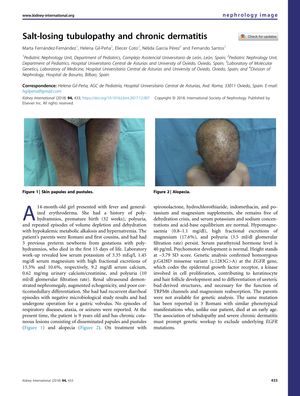Salt-Losing Tubulopathy and Chronic Dermatitis
July 2018
in “
Kidney international
”

TLDR Genetic testing for EGFR mutations is crucial in similar cases.
A 14-month-old girl with a history of polyhydramnios, premature birth, and recurrent dehydration presented with fever and generalized erythroderma. Laboratory tests showed hypokalemia, hypomagnesemia, hypernatremia, and polyuria. Renal ultrasound revealed nephromegaly and poor corticomedullary differentiation. Despite recurrent diarrheal episodes and a gastric volvulus operation, she had no respiratory diseases, ataxia, or seizures. At 9 years old, she had chronic cutaneous lesions, alopecia, and normal psychomotor development but remained short in stature. Genetic analysis identified a homozygous p.G428D missense variant in the EGFR gene, linked to her symptoms. Treatment with spironolactone, hydrochlorothiazide, indomethacin, and supplements stabilized her condition, though hypomagnesemia and polyuria persisted. The study highlighted the importance of genetic workup for EGFR mutations in similar cases.




